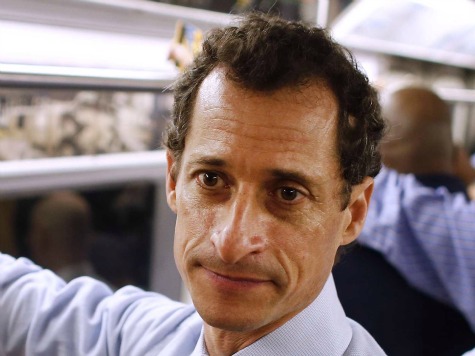Anthony Weiner does not have a sex addiction. We know that, because sex addiction probably does not exist.
As the Huffington Post reported last week, a new UCLA study shows that people who report uncontrollable urges to view sexual images do not have the same physiological responses as drug addicts. As the Playboy Advisor once observed skeptically: when was the last time a sex addict robbed a store to fund his habit?
Repetitive sexual behavior is more likely a result of high “libido,” the UCLA study’s authors say. But it is probably best described as a compulsion–the kind of behavior that should be managed so that those who engage in it can enjoy healthy sex lives without harming other people or themselves. Weiner’s compulsions are extreme, but still fall, perhaps, somewhere within the outer reaches of “normal” human sexual behavior.
The question is why Weiner has not tried to manage that behavior or channel his impulses positively. He told the New York Post that in the wake of his 2011 scandal, he saw a therapist in Texas for just a “couple of days,” merely three or four times at most. (In contrast, his wife, Huma Abedin, said at his news conference Tuesday that she had gone through “a lot of work and a whole lot of therapy” to restore their message.)
Though Weiner told a press conference Tuesday that he has taken “responsibility” for his behavior, it is not clear how.
Indeed, it is striking just how indiscreet his indiscretions have been. In his online relationships, both old and new, Weiner frequently used his celebrity to attract strangers–despite the risk, even after resigning, and even after he had returned to the public stage to claim that he was “a very, very different person.”
True, Weiner’s irresponsible behavior is no match for the outrageous conduct of San Diego mayor Bob Filner, who clings to office after admitting to serious accusations of sexual harassment (accusations that his party, and the media, long overlooked).
And if Ms. Abedin is willing to forgive her husband, and trust him again, after he reneged on a tearful public apology and assurances of reform, that is certainly her right.
But there is no reason for the public to trust him.
Not after he lied about being “hacked” (with no regard for the innocent people whom, he implied, had done the hacking). Not after he pursued the major mainstream media outlets to issue vehement denials that, after Andrew Breitbart’s intervention, Weiner was forced to retract. Not after he made public claims that he had changed his behavior–claims, once again, proven false.
It is that habit of lying that Kirsten Powers, once Weiner’s friend, described as “sociopathic“–i.e. without conscience for others.
Nudity is harmless, in an appropriate context; sexual fantasies can enliven relationships, in private; infidelity is painful and morally wrong, but it is something many couples endure. What is disturbing about Eliot Spitzer is his prosecutorial hypocrisy; with Weiner, it is his arrogance.
Many voters–both Republican and Democrat, both conservative and liberal–are prepared to tolerate some amount of sexual eccentricity or misbehavior. Bill Clinton is still popular within his party, for example, and conservative voters defied the GOP elite by electing Mark Sanford to Congress. Both lied to the public. But both also performed public gestures of repentance. Sincere or not, they at least paid homage to the process.
Voters also know that many people struggle with compulsions or addictions of one form or another at some time in their lives, politicians included. There are politicians with eating disorders, public figures suffering with drug abuse, and so on. In the public eye, they must suffer in silence–if they are lucky. And if their problems are widely exposed, then they face the pain and humiliation of the most intimate public scrutiny.
Voters are willing to forgive, and even to trust those who have lied to them–but usually only if they feel those leaders stand for something more than themselves.
And that leads to Anthony Weiner’s real problem. He has built his campaign around an empty promise to make New York the “middle-class capital of the world”–as if all New Yorkers really wanted was for their city to be a bit more like Dayton, Ohio or Peoria, Illinois.
Weiner’s core constituency is not the “middle class” but the progressive left, which has always admired his polemical style. His unlikely campaign has succeeded thus far because of name recognition against a field of mediocre rivals.
Yet that strategy ultimately depends on Weiner’s personal assurances that he has changed–assurances that have since been exposed as not only fraudulent, but also calculating and opportunistic.
Weiner’s worst compulsion may not be sexual, but political. He is drawn to public life to create a persona that he uses, in turn, to create online fantasies–a quest for self-fulfillment at the expense of both political and personal commitments. He refuses to take real responsibility for his behavior, while campaigning for the duties of office.
That holds risks for the public–and for him. Voters may soon have the chance to help.

COMMENTS
Please let us know if you're having issues with commenting.